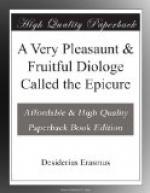sighes: yea, & they shulde haue considered both
that there is noo pleasure aboue ye ioyfulnes of the
heart, and that chearefull mynde maketh agee too florishe,
an heauy spirit consumeth the boones, & also that
all the dayes of the poore are euell: that is,
sorowfull and wretched. And agayne a quiet mynde
is lyke a contynuall feaste. _SPVDEVS._ Therfore they
bee wyse, that thryue in tyme, and gather too gether
necessaries for that agee coo[m]. HEDONI.
The holy scripture intreateth not soo wordely || as
too measure the felicitie and highe consolation of
manne, by the goodes of fortune, onely he is very
poore, that is destitute and voyde of al grace & vertue,
and standeth in boundage and debette, bothe of bodye
& solle vnto that tyranne oure moost foo & mortall
enemie the deuill. SPV. Surely he is one that
is veri rigorous and impatient in demaundynge of his
dutie. HE. Moreouer that man is ryche, whiche
fyndeth mercye and foryeouenes at the handes of god.
What shuld he feare, that hath suche a protectour?
Whether men? where as playnely theyr hole power may
lesse do agaest God, then the bytyng of a gnat, ||
hurteth the Elephant. Whether death? truly that
is a right passage for good men vnto all sufficient
ioy and perfection accordyng too the iust reward of
true religion and vertue. Whether hell?
For as in that the holy prophete speaketh boldely
vnto God. Although I shulde walke in the middest
of the shadow of death, I wil not feare any euils
because ye art with me. Wherfore shulde he stande
in feare of deuils, whiche beareth in his heart hym,
that maketh the deuils too tremble and quake.
For in diuers places the holye scripture praiseth
and declareth opely the mynde of a vertuous man, too
bee the right temple of God. And this to bee so
true that || that it is not too bee spoken agaynst,
ne in any wise shuld bee denied. SPV. Forsoth
I can not see, by what reason these saiynges of yours
can be confuted al thoughe they seme too varye muche
from the vulgar and comune opinion of men. HEDO.
Why doo they soo? SPV. After your reasonyng
euery honest poore man, shulde liue a more pleasaunt
life, then any other, how much soeuer he did haboud
in riches, honour, and dignitie: and breuely though
he had all kynde of pleasures. HE. Adde this
too it (if it please you) too bee a kyng, yea, or
an emperour if you take away a quiet mynd with it
selfe, I dare boldely say, that the poore man sklenderlye
|| and homely appareled, made weake with fastyng,
watchyng, great toile and labour, and that hath scarcely
a groat in all the worlde, so that his mynde bee godly,
he lyueth more deliciously then that man whiche hathe
fyue hudreth times greater pleasures & delicates,
then euer had Sardanapalus. SP. Why is
it the, that we see communely those that bee poore
looke farre more heuely then riche men. HED.
Because some of them bee twise poore, eyther some
desease, nedines, watchyng, labour, nakednesse, doo




